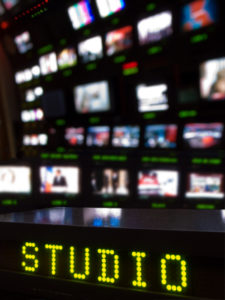Seven Things You Need To Know Before Going On TV
A few years ago, I accompanied one of our clients to CNN’s Washington, DC bureau for a live interview on Lou Dobbs Tonight. Since I had worked at that bureau for a couple of years in the late 1990s and knew it well, I was able to tell her exactly what she could expect.
But it turned out I was totally wrong. In the years since I’d left, CNN had built a new “studio,” which was nothing more than a converted coat closet. My client had to sit on a stool in that tiny, closet-sized booth, and had to speak to a camera operated by a technician hundreds of miles away.
Television is a strange medium. This post will help strip away some of television’s mystery by arming you with seven logistical and technical details you’ll need to know to succeed in your next television interview.
1. Makeup: Most major networks and some larger local stations provide a makeup artist. Ask in advance whether you will have access to one, but bring your own makeup and hair products just to be safe. If you won’t have access to an artist, this makeup guide will help.
2. Microphones and Ear Pieces: You will often wear a lapel microphone during your interview. The wires should be hidden – women can run the cord beneath their tops, and men should tape the cord to the back of their tie. Make sure the microphone isn’t brushing up against clothing or jewelry, which will make you sound muffled. You may also be fitted with an ear piece, also known as an IFB. Test the audio before your interview begins and tell the crew immediately if the volume isn’t quite right.
3. Turn The Monitor Off: Television monitors often show a feed that is delayed by a fraction of a second. That can be extremely distracting, so ask the crew to turn off the studio monitors. This article explains more about the downsides of monitors.
4. Split Screen: In some formats, you will appear on-camera even when you’re not speaking. “Split screen” shots show you and at least one other person at the same time, and “reaction” shots show your reaction to another guest’s comments. Act as if you’re always on, and be careful not to wipe your face, adjust your hair, or fix your outfit during your segment.
5. Nodding: It’s normal to nod when listening to someone else, but that nodding can send the wrong message if you disagree with the premise of someone’s question or comment. Listen attentively, but don’t nod along with an incorrect premise.
6. Props: We’ve all seen that television guest who holds up a piece of paper or newspaper article during a television appearance. It’s usually a bad idea. Few people know how to position an item properly for cameras to pick it up, so it usually ends up distracting the audience. If you want to show something during your interview, talk to the producer first. The producer can help the crew prepare for the shot in advance.
7. Stay Where You Are: Avoid the temptation to flee your chair the moment your segment ends. Maintain your pose for a few seconds and stay seated until a member of the crew tells you you’re clear.
Do you want to become a better public speaker and media spokesperson? Follow our tweets to follow the latest! We’re at @MrMediaTraining or www.Twitter.com/MrMediaTraining.
Related: How to Dress For A Television Appearance
Related: Nine Things Inexperienced Media Spokespersons Need to Know




Great tips, Brad. Christine O’Donnell (or her team) could have used them in her interview with Piers Morgan last week. 🙂 In all seriousness, you can never be too prepared; this list gets you as close to that as you can be! And thanks for the follow – that’s how I found your blog. I like it very much!
Erica – Thank you for the nice words! I’m glad you’ve found the blog, and hope you become a “regular.”
Best wishes,
Brad
Thanks for sharing your expertise.
Great tips! I’ve experienced all of these scenarios at one time or another and had to learn the hard way.
Thanks, Hugh! It’s always good to hear from someone who’s experienced these firsthand as confirmation that the tips are relevant. Sorry you had to learn the hard way, though. Anything in particular you learned from your own experience?
Thanks for commenting,
Brad